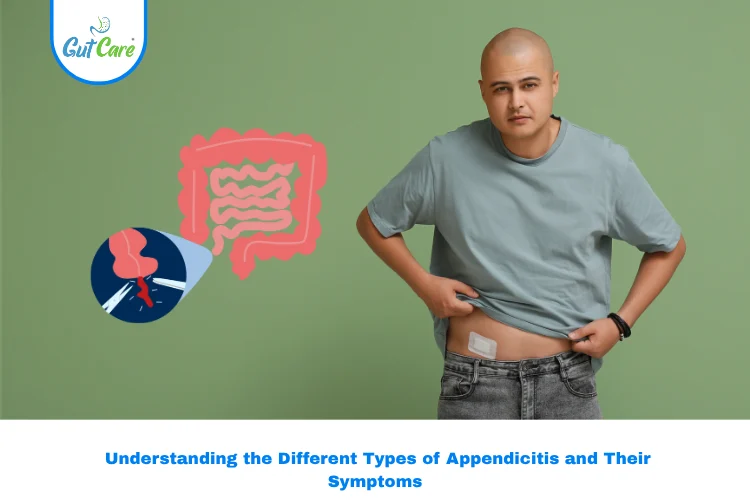When people think about appendix problems, the first thing that comes to mind is appendicitis. But did you know there are different types of appendicitis that can affect the body in different ways? At Gutcare Clinics in Bangalore, specialists like Dr. Yuvrajsingh Gehlot, an experienced colorectal surgeon, help patients understand the condition, its variations, and how timely treatment can make a huge difference.
In this guide,The different types of appendicitis, explore the signs and symptoms of appendicitis, and explain why professional care is essential when you notice problems with your appendix.
What Is Appendix Disease?
The appendix is a small tube-like structure attached to the large intestine. Though once thought to have no function, research suggests it may play a role in gut immunity. Appendix disease occurs when this organ becomes inflamed or infected, leading to appendicitis.
Understanding the parts of the appendix and why it becomes inflamed is key to knowing why appendix happen in some people. Causes often include:
- Blockage by stool or foreign material
- Swelling due to infections
- Genetic or anatomical variations
- Less commonly, tumors
Types of Appendicitis
Not all appendicitis cases are the same. Knowing the types of appendicitis helps doctors choose the right treatment approach.
1. Acute Appendicitis
- Definition: The most common type, it occurs suddenly and progresses quickly.
- Symptoms: Severe abdominal pain (often starting near the navel and moving to the lower right side), nausea, fever, and vomiting.
- Impact: Requires urgent surgery to prevent rupture.
2. Chronic Appendicitis
- Definition: A less common type, where inflammation is mild but lasts for weeks or months.
- Symptoms: Recurrent abdominal discomfort, mild fever, or bloating.
- Impact: Harder to diagnose because symptoms mimic other digestive issues.
3. Complicated Appendicitis
- Definition: When the appendix bursts or develops an abscess due to delayed treatment.
- Symptoms: Severe pain, high fever, pus collection, and infection spreading to other organs.
- Impact: Life-threatening if untreated; requires immediate surgery and antibiotics.
4. Subacute Appendicitis
- Definition: Rare and develops more slowly than acute appendicitis.
- Symptoms: Moderate pain and discomfort that worsen gradually.
- Impact: May progress to acute or chronic forms if ignored.
Signs and Symptoms of Appendicitis
Recognizing the signs and symptoms of appendicitis is critical for early detection. Common indicators include:
- Sudden abdominal pain (especially in the lower right abdomen)
- Nausea and vomiting
- Fever and chills
- Constipation or diarrhea
- Loss of appetite
- Pain that worsens while coughing, sneezing, or walking
If you notice these symptoms, consult a colorectal surgeon immediately. At Gutcare Clinics, Bangalore, Dr. Yuvrajsingh Gehlot provides advanced diagnostic and surgical care tailored for patients with appendix disease.
Why Do Different Types of Appendicitis Occur?
The reason for fistula and the reason for appendicitis share something in common: both involve blockages or infections in sensitive body areas. In appendicitis, the blockage may come from hardened stool, swollen lymph nodes, or infections spreading from other parts of the gut.
Factors that increase risk include:
- Family history of appendix disease
- Low-fiber diets that cause constipation
- Frequent gut infections
- Structural differences in the parts of the appendix
Treatment Options for Appendicitis
Treatment depends on the types of appendicitis diagnosed:
- Acute appendicitis → Surgery (appendectomy) is the gold standard.
- Chronic appendicitis → Surgical removal if recurrent.
- Complicated appendicitis → Emergency surgery plus antibiotics.
- Subacute appendicitis → Careful monitoring, antibiotics, or surgery depending on progression.
Some patients ask about natural methods or medicines, but appendicitis should not be treated with home remedies. Unlike acidity or reflux, appendix disease can turn life-threatening quickly.
When to See a Colorectal Surgeon
Never ignore abdominal pain that worsens over time. Visiting a qualified doctor such as Dr. Yuvrajsingh Gehlot at Gutcare Clinics, Bangalore ensures accurate diagnosis and safe treatment. A colorectal surgeon specializes in conditions like appendicitis, fissures, and fistulas, making them the best choice for such cases.
Conclusion
Different types of appendicitis can affect people in different ways, but all share one thing in common they need timely attention. From acute cases that require immediate surgery to chronic conditions that cause recurring discomfort, early diagnosis is vital.
If you experience any of the signs and symptoms of appendicitis, don’t delay. Reach out to a trusted expert like Dr. Yuvrajsingh Gehlot at Gutcare Clinics in Bangalore for proper evaluation and treatment. Quick action not only saves you from severe pain but also prevents dangerous complications.
Frequently Asked Questions (FAQs)
1. What are the main types of appendicitis?
The main types of appendicitis are acute, chronic, complicated, and subacute. Each differs in symptoms, severity, and required treatment.
2. What are the early signs and symptoms of appendicitis?
Common signs include sudden abdominal pain, nausea, fever, and loss of appetite. If pain shifts to the lower right abdomen, immediate medical care is needed.
3. Why does appendicitis happen?
Appendicitis usually occurs due to blockage of the appendix by stool, infections, or swelling in the intestinal lining.
4. Can all types of appendicitis be treated with surgery?
Most cases, especially acute and complicated types, require surgery. Chronic or subacute cases may sometimes be monitored first but often need removal eventually.
5. Where can I get treatment for appendix disease in Bangalore?
You can consult Dr. Yuvrajsingh Gehlot, a leading colorectal surgeon at Gutcare Clinics, Bangalore, for expert care in all types of appendicitis.




